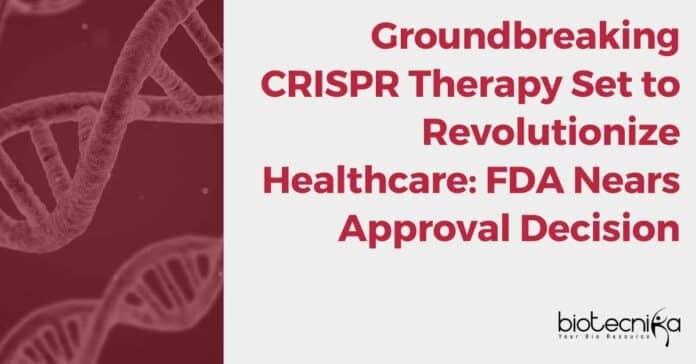Groundbreaking CRISPR Therapy Set to Revolutionize Healthcare: FDA Nears Approval Decision
The field of gene editing has witnessed remarkable advancements over the past decade, with the pioneering CRISPR gene editing technology leading the charge. This revolutionary technology, which involves using molecular scissors to make precise cuts in DNA, has gained global recognition and even won its creators a Nobel Prize. The possibilities and potential of CRISPR have ignited a race among researchers and pharmaceutical companies to develop gene-altering medicines that could transform the landscape of healthcare.
Exciting news has recently emerged from the realm of gene therapy. Vertex Pharmaceuticals and CRISPR Therapeutics have announced that they are on the verge of achieving a groundbreaking milestone: the first FDA-approved CRISPR therapy. The therapy in question has been specifically designed to address two blood diseases: sickle cell disease and transfusion-dependent beta thalassemia.
The FDA has accepted the biologics license applications for both therapies, granting a priority review for sickle cell disease and a standard review for beta thalassemia. The agency is expected to make an approval decision for sickle cell disease by December 8, 2023, and for beta thalassemia by March 30, 2024.
Clinical trials conducted for both conditions have yielded promising
results. In the case of sickle cell disease, an impressive 94% of patients experienced at least one whole year without the excruciating pain caused by blood clot crises. Similarly, in the beta thalassemia trial, 89% of patients managed to avoid regular blood transfusions for a minimum of one year.Researchers involved in the studies are optimistic about the potential of this therapy. Franco Locatelli, a professor of pediatrics at the Sapienza University of Rome and one of the study leaders, remarked, “This therapy offers the potential of a functional cure for patients.” The data from the trials were presented at the annual European Hematology Association Congress and include a median follow-up of nearly 44 months, representing about half of the total number of patients in each trial.
The root cause of both sickle cell disease and beta thalassemia lies in a single genetic typo in the hemoglobin protein responsible for carrying oxygen. While the first-generation CRISPR tool used in the therapy is adept at breaking genes, it falls short when it comes to fixing them. However, researchers have devised an ingenious solution: activating a version of hemoglobin that is typically produced during fetal development. By utilizing CRISPR to target the BCL11A gene, which inhibits fetal hemoglobin production, scientists have managed to compensate for the defective adult hemoglobin, as observed in animal and human studies.
The therapeutic process involves collecting a patient’s blood stem cells, which are then transported to a laboratory for editing. After a thorough quality check, the modified cells are shipped back to the patient, who undergoes chemotherapy to create space for the reintroduction of the edited cells.
While the CRISPR therapy has shown an impressive safety profile in sickle cell patients, there have been some severe adverse reactions reported in beta thalassemia patients. These reactions include acute respiratory distress syndrome, a dangerous lung injury, and hemophagocytic lymphohistiocytosis, a potentially fatal systemic immune reaction.
In the race to bring CRISPR-based therapies to market, CRISPR Therapeutics and Vertex Pharmaceuticals have taken the lead over their competitor, bluebird bio. Bluebird bio submitted its gene therapy for sickle cell disease to the FDA in April, utilizing a lentiviral vector to introduce the adult hemoglobin gene into a patient’s blood stem cells.
Both CRISPR Therapeutics and Vertex anticipate the FDA’s acceptance of their filing. As of now, bluebird bio has not provided any updates and expects to hear from the FDA by the end of the month.
If approved, the first CRISPR therapy could usher in a new era of gene-based treatments. Patients suffering from sickle cell disease and beta thalassemia could benefit from a potential functional cure, significantly improving their quality of life. The successful development and approval of this therapy would not only provide hope for patients but also pave the way for further advancements in the field of gene editing and personalized medicine.
In conclusion, the FDA’s upcoming decision regarding the approval of the first CRISPR therapy marks a significant milestone in the field of gene editing and healthcare as a whole. The promising clinical trial results, coupled with the innovative approach of activating fetal hemoglobin production, provide hope for patients affected by sickle cell disease and beta thalassemia. As the scientific community eagerly awaits the FDA’s decision, it is clear that we are on the brink of a new chapter in medical history—one that holds the potential to transform lives and redefine the future of healthcare.



























